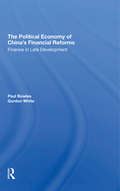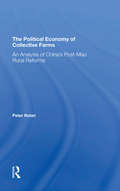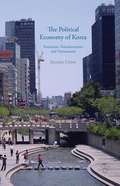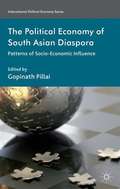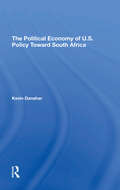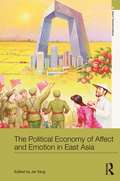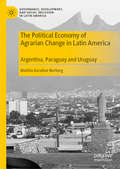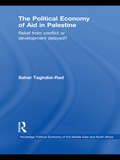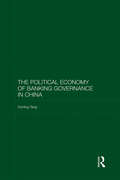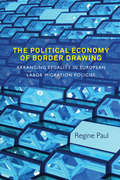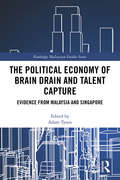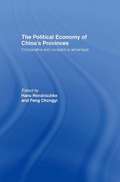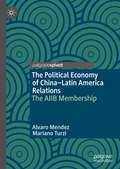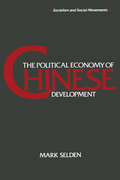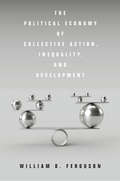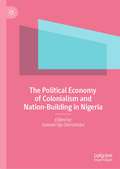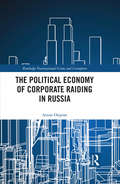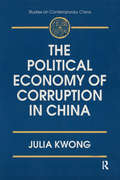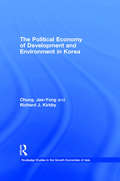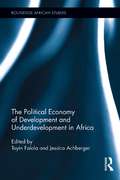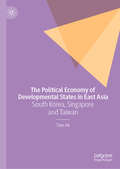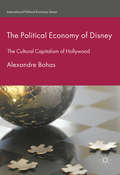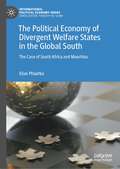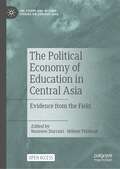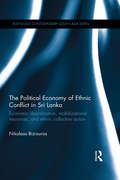- Table View
- List View
The Political Economy Of China's Financial Reforms: Finance In Late Development
by Paul Bowles Gordon WhiteTHIS PATHBREAKING Work analyzes the evolution of China's financial reforms since 1979. China's reformers have stressed the construction of a more diverse, flexible, and competitive financial system as a crucial element of China's economic reform program. The authors assess the theory and practice of financial reform in light of China's specific characteristics as a large, developing country that still claims to be pursuing the goal of establishing a new form of "socialist" market economy. The authors utilize two approaches. First, they place the overall design and trajectory of. financial reform since 1979 within a broad comparative framework of alternative strategies of financial reform and financial systems. Second, they use a political economy perspective to explore the complex interactions among the political and economic actors— individual, group, or institutional—that affect reform outcomes. Integrating these two approaches, the authors conclude by assessing future directions for feasible and desirable financial reform in China.
The Political Economy Of Collective Farms: An Analysis Of China's Post-mao Rural Reforms
by Peter NolanThis book examines the case for and against collective farms in developing countries. Basing his account on a careful analysis of China's rural economy from the 1950s to the 1980s, the author argues that collective farms have serious shortcomings and that they are not the most suitable institutional form for rural economic development in poor count
The Political Economy Of Korea
by Jitendra UttamKorea's twin transitions - agrarian to industrial and industrial to post-industrial - transformed the country's political economy. Moving away from the traditional focus on aspects such as market, culture, and colonialism, the author argues that Korea's 'second state' was revitalized through the 'people's movement' and 'citizens movement'.
The Political Economy Of South Asian Diaspora
by Gopinath PillaiThe South Asian diaspora is a diverse group who settled in different parts of the world, often concentrated in developed countries. This volume explores how transnational politics overlap with religious ideologies, media and culture amongst the disapora, contributing to diasporic identity building in host countries.
The Political Economy Of U.s. Policy Toward South Africa
by Kevin DanaherBy tracing U.S. involvement in South African political and economic development since the late 1800s, this book analyzes U.S. corporate and government motives for maintaining the political status quo in South Africa. In recent decades, according to the author, U.S. policy toward South Africa has grown more contradictory: Endeavoring to protect the United States's reputation on the question of race, government officials denounce apartheid, yet Washington remains the main force blocking an international response to South African policies. As the situation in South Africa continues to polarize, the U.S. is increasingly isolated in its position of verbally condemning yet materially supporting South Africa's white minority regime--a regime confronting the distinct possibility of civil war.
The Political Economy of Affect and Emotion in East Asia (Asia's Transformations)
by Jie YangWhen thinking about the culture and economy of East Asia, many attribute to the region a range of dispositions, including a preference for consensus and social harmony, loyalty and respect towards superiors and government, family values, collectivism, and communitarianism. Affect is central to these concepts, and yet the role of affect and its animated or imagined potentialities in the political economy of East Asia has not been systematically studied. The book examines the affective dimensions of power and economy in East Asia. It illuminates the dynamics of contemporary governance, and ways of overcoming common Western assumptions about East Asian societies. Here, affect is defined as felt quality that gives meaning and imagination to social, political, and economic processes, and as this book demonstrates, it can provide an analytical tool for a nuanced and enriched analysis of social, political, and economic transformations in East Asia. Through ethnographic and media analyses, this book provides a framework for analyzing emerging phenomena in East Asia, such as happiness promotion, therapeutic governance, the psychologization of social issues, the rise of self-help genres, transnational labor migration, new ideologies of gender and the family, and mass-mediated affective communities. Through the lens of affect theory, the contributors explore changing political configurations, economic engagements, modes of belonging, and forms of subjectivity in East Asia, and use ethnographic research and discourse analysis to illustrate the affective dimensions of state and economic power and the way affect informs and inspires action. This interdisciplinary book will be of great interest to students and scholars of Asian studies, anthropology, sociology, media studies, history, cultural studies, and gender and women’s studies.
The Political Economy of Agrarian Change in Latin America: Argentina, Paraguay and Uruguay (Governance, Development, and Social Inclusion in Latin America)
by Matilda Baraibar NorbergThis book makes an original contribution to the discussion about agro-food exporting countries’ governmental policy. It presents a historicized and internationally contextualized exploration of the political economy of agrarian change in three Latin American countries: Argentina, Praguay, and Uruguay. By comparatively examining how these states have acted in a context of global driven market forces and historically formed institutions, the monograph illuminates the differing capacities of state autonomy under the present era of globalized agriculture.
The Political Economy of Aid in Palestine: Relief from Conflict or Development Delayed? (Routledge Political Economy of the Middle East and North Africa)
by Sahar Taghdisi-RadDespite for many years receiving the highest per capita aid worldwide, the economies of the West Bank and Gaza Strip have failed to achieve any lasting developmental outcomes and suffer from major weaknesses which undermine their very survival. This book argues that the dominant, mainstream approach to the study of aid and aid effectiveness is theoretically and empirically inadequate for a comprehensive understanding and analysis of the workings of aid in developing countries, particularly those undergoing conflict. This book examines the nature of donor operations in Palestine, highlighting the political and ideological determinants of aid allocation and effectiveness, and focussing on the role of trade-related donor assistance in Palestine, more commonly known as Aid for Trade. It discusses how such trade-related assistance is only another instance of donors working ‘around’ the conflict, as opposed to taking it into account; and how aid to Palestine cannot bring about significant improvement as long as the Palestinian economy is fundamentally affected by Israeli occupation, settlements and blockade. It argues that unless restructured and more carefully targeted, aid can only act as a temporary relief mechanism. Furthermore, the book sheds light on critical areas within Palestinian territories that are in need of development and require significant and immediate attention at both national and international level.
The Political Economy of Banking Governance in China (Routledge Studies on the Chinese Economy)
by Xuming YangChinese state banks, which were considered technically insolvent in the 1990s, are at present among the largest and most important banks in the world. This book, based on the author’s research and also on his extensive experience of working in Chinese banks, explores how Chinese banks’ technical efficiency and organisational flexibility have been achieved whilst ownership and control by the Chinese Communist Party have continued. The author reveals a distinctly non-Western approach to corporate governance, but one that has nevertheless worked very well.
The Political Economy of Border Drawing: Arranging Legality in European Labor Migration Policies
by Regine PaulThe conditions for non-EU migrant workers to gain legal entry to Britain, France, and Germany are at the same time similar and quite different. To explain this variation this book compares the fine-grained legal categories for migrant workers in each country, and examines the interaction of economic, social, and cultural rationales in determining migrant legality. Rather than investigating the failure of borders to keep unauthorized migrants out, the author highlights the different policies of each country as “border-drawing” actions. Policymakers draw lines between different migrant groups, and between migrants and citizens, through considerations of both their economic utility and skills, but also their places of origin and prospects for social integration. Overall, migrant worker legality is arranged against the backdrop of the specific vision each country has of itself in an economically competitive, globalized world with rapidly changing welfare and citizenship models.
The Political Economy of Brain Drain and Talent Capture: Evidence from Malaysia and Singapore (Routledge Malaysian Studies Series)
by Adam TysonBrain drain and talent capture are important issues globally, and especially crucial in countries such as Malaysia and Singapore, which aspire to be innovation-driven advanced economies. This book provides a thorough analysis of the impact of brain drain on middle-income Malaysia and high-income Singapore, where the political salience of the problem in both countries is high. It discusses the wider issues associated with brain drain, such as when rich countries increase their already plentiful stocks of, for example, medical practitioners and engineers at the expense of relatively poor countries, examines the policies put in place in Malaysia and Singapore to counter the problem and explores how the situation is further complicated in Malaysia and Singapore because of these countries’ extensive state interventionism and sociopolitical tensions and hierarchies based on ethnicity, religion and nationality. Overall, the book contends that talent enrichment initiatives serve to construct and secure privilege and ethnic hierarchy within and between countries, as well as to reinforce the political power base of governments.
The Political Economy of China's Provinces: Competitive and Comparative Advantage
by Feng Chongyi Hans HendrischkeTraditionally, political scientists and economists have seen China as a single entity and business people have seen China as a single market. This book challenges the notion of a centralised and unified China, and outlines how provinces are taking on new economic and political roles, forced upon them by decentralisation.It is the most thorough data on contemporary Chinese provinces available and will be of great interest to researchers and graduate students of politics, economics and business as well as Asian studies.
The Political Economy of China–Latin America Relations: The AIIB Membership
by Mariano Turzi Alvaro MendezThe book explores the ways in which Latin American states are capitalizing or failing to capitalize on the initiatives of China in world affairs. The authors hypothesize that a dearth of regional agency and social construction, and a consequent institutional deficit in foreign relations, characterizes Latin America and its inadequate reaction to Chinese agency. The volume includes multiple case studies from eight Latin American countries and discusses the Asian Infrastructure Investment Bank’s initiatives and policies. The book will interest scholars, researchers, policy-makers, foreign policy analysts, and graduate students in Latin American and Asian politics as well as development studies and political economy.
The Political Economy of Chinese Development (Socialism And Social Movements Ser.)
by Mark SeldenThe first edition of "The Political Economy of Chinese Socialism" reconceptualized the political economy of China by highlighting the changing character of urban-rural and state-society conflicts in the era of Mao Zedong's leadership and in the contemporary post-Mao reforms. The economic and social crises that engulfed China - and indeed much of the rest of the socialist world - in the late 1980s, culminating in the 1989 democratic movement and its suppression, stimulated a rethinking of central propositions of the first edition. It particularly led the author to inquire anew into the meaning of socio-political as well as economic development in a populous and poor agrarian nation. This volume, then, assesses the economic performance and social consequences of China's political economy over four decades, with a focus on China's countryside and city-countryside relations. In addition to a reconceptualization and updating of the introductory chapter, there is a new chapter, "The Social Origins and Limits of the Chinese Democratic Movement".
The Political Economy of Collective Action, Inequality, and Development
by William D. FergusonThis book examines how a society that is trapped in stagnation might initiate and sustain economic and political development. In this context, progress requires the reform of existing arrangements, along with the complementary evolution of informal institutions. It involves enhancing state capacity, balancing broad avenues for political input, and limiting concentrated private and public power. This juggling act can only be accomplished by resolving collective-action problems (CAPs), which arise when individuals pursue interests that generate undesirable outcomes for society at large. Merging and extending key perspectives on CAPs, inequality, and development, this book constructs a flexible framework to investigate these complex issues. By probing four basic hypotheses related to knowledge production, distribution, power, and innovation, William D. Ferguson offers an analytical foundation for comparing and evaluating approaches to development policy. Navigating the theoretical terrain that lies between simplistic hierarchies of causality and idiosyncratic case studies, this book promises an analytical lens for examining the interactions between inequality and development. Scholars and researchers across economic development and political economy will find it to be a highly useful guide.
The Political Economy of Colonialism and Nation-Building in Nigeria
by Samuel Ojo OloruntobaThis book examines the ways in which colonialism continues to define the political economy of Nigeria sixty years after gaining political independence from the British. It also establishes a link between colonialism and the continued agitation for restructuring the political arrangement of the country. The contributions offer various perspectives on how the forceful amalgamation of disparate units and diverse nationalities have undermined the realization of the development potential of Nigeria.The book is divided into two parts. The first part interrogates the political economy of colonialism and the implications of this on economic development in contemporary Nigeria. The second part examines nation-building, governance, and development in a postcolonial state. The failure of the postcolonial political elites to ensure inclusive governance has continued to foster centrifugal and centripetal forces that question the legitimacy of the state. The forces have deepened calls for secession, accentuated conflicts and predispose the country to possible disintegration. A new government approach is required that would ensure equal representation, access to power and equitable distribution of resources.
The Political Economy of Corporate Raiding in Russia (Routledge Transnational Crime and Corruption)
by Ararat OsipianCorporate raiding – the shocking phenomenon whereby criminals, business rivals and even state bureaucrats visit business headquarters and force owners or staff to transfer business assets, land or property – is an increasing problem in Russia. This book, based on extensive original research, provides a comprehensive overview of this activity. It describes the nature of corporate raiding, provides numerous case studies and discusses the role of the state and government officials. Overall the book argues that the prevailing climate of business and government in Russia leads to a situation where control is closely linked to corruption and coercion.
The Political Economy of Corruption in China (Studies On Contemporary China)
by Julia KwongThis text examines all facets of corruption: meaning, incidence, monetary value, the kinds of goods exchanged, the perpetrators and their strategies, in China since 1949. It explores the irony of how ideology and organizational structures under socialism can both restrain and encourage corruption.
The Political Economy of Development and Environment in Korea (Routledge Studies in the Growth Economies of Asia)
by Jae-Yong Chung Richard J. KirkbyThis book looks at Korea's economic, social and spatial development processes from the early Modernisation period to the financial crisis of 1997. It focuses on the political and ideological control of the state during the developmental era, as well as the environmental problems of Korea, and examines how society and environment have been used as means to attain rapid accumulation. Providing an holistic approach to Korean development, this title allows a comprehensive view of Korea's economic miracle as well as its recent problems.
The Political Economy of Development and Underdevelopment in Africa (Routledge African Studies #10)
by Toyin Falola Jessica AchbergerWhile Africa is too often regarded as lying on the periphery of the global political arena, this is not the case. African nations have played an important historical role in world affairs. It is with this understanding that the authors in this volume set out upon researching and writing their chapters, making an important collective contribution to our understanding of modern Africa. Taken as a whole, the chapters represent the range of research in African development, and fully tie this development to the global political economy. African nations play significant roles in world politics, both as nations influenced by the ebbs and flows of the global economy and by the international political system, but also as actors, directly influencing politics and economics. It is only through an understanding of both the history and present place of Africa in global affairs that we can begin to assess the way forward for future development.
The Political Economy of Developmental States in East Asia: South Korea, Singapore and Taiwan
by Tian HeThis book explores the variations in the transformation of the Asian developmental state in South Korea, Singapore, and Taiwan. Based on an original theory, the author argues that these variations are influenced by two factors: industrial structure and democratic transition, both of which are shaped by the strategic calculations of the ruling elites to maintain power. The theory concerns two concurrent political processes during the state’s development process, namely the emergence of economic interest groups with varying levels of policy constraints on the state; and the process of democratic transition driven by the rise of the middle class. The book will appeal to students and researchers in the fields of Asian politics, development studies, political economy and comparative politics.
The Political Economy of Disney
by Alexandre BohasThis book sheds new light on the socio-economic impact of multinational corporations. Combining Cultural Studies and International Political Economy, it provides a revealing analysis of the Walt Disney Company, and by extension the wider Hollywood studio system. It does so by examining the cultural and economic forces powering the industry's expansion, the 'civilisation' that Disney disseminates, and the various ways that societies beyond the USA have adopted facets of the Hollywood productions to which they are exposed. Identifying both the strengths and the weaknesses of these transnational firms, it demonstrates the significance of their contribution to American power and predominance.
The Political Economy of Divergent Welfare States in the Global South: The Case of South Africa and Mauritius (International Political Economy Series)
by Elias PhaahlaThis study traces the welfare regimes of Mauritius and South Africa from the early 20th century focusing on the historical circumstances that gave rise to the dominance of state-funded old-age pensions within their respective welfare frameworks. It highlights intersections between powerful business interests, the state, and social forces that sowed the seeds of social entitlements. Due to different mobilisation efforts of these social actors, both countries have spawned welfare regimes of different persuasions. Mauritius has maintained its long-standing traditions as a social democracy stretching back to the late 1950s, while South Africa continues relentlessly in pursuit of a liberal welfare state, a journey it has treaded since 1928 when the old-age pension laws first came into effect. While unravelling the innermost workings of welfare state development in Mauritius and South Africa, it also probes the present political and economic circumstances that have kept these two welfare regimes resolutely unchanged. Against this backdrop, it draws parallels between current welfare outcomes and those of old as they continue to chart their way into the future.
The Political Economy of Education in Central Asia: Evidence from the Field (The Steppe and Beyond: Studies on Central Asia)
by Naureen Durrani Hélène ThibaultThis open access book is intended as an original contribution to the conversation on the role and challenges of education in Central Asia to promote social cohesion by looking at Kazakhstan, Tajikistan and Uzbekistan. Examining education challenges within the countries’ wider historical, social, political, and cultural context, the contributions explore existing discourses concerning national identity, religion, language, gender, inclusion, internationalisation of education, and non-state actors through a Political Economy Analysis (PEA) lens. With the understanding that education is both a powerful mechanism of social reproduction in societies and a driver of social change, the book attempts to promote political economy analysis of education as a helpful analytical tool for educational debates and reform agendas in the region and thus will be a valuable resource for policymakers, practitioners, and scholars in this region and beyond.
The Political Economy of Ethnic Conflict in Sri Lanka: Economic Liberalization, Mobilizational Resources, and Ethnic Collective Action (Routledge Contemporary South Asia Series)
by Nikolaos BiziourasAt the point of independence in 1948, Sri Lanka was projected to be a success story in the developing world. However, in July 1983 a violent ethnic conflict which pitted the Sinhalese against the Tamils began, and did not come to an end until 2009. This conflict led to nearly 50,000 combatant deaths and approximately 40,000 civilian deaths, as well as almost 1 million internally-displaced refugees and to the permanent migration abroad of nearly 130,000 civilians. With a focus on Sri Lanka, this book explores the political economy of ethnic conflict, and examines how rival political leaders are able to convince their ethnic group members to follow them into violent conflict. Specifically, it looks at how political leaders can influence and utilize changes in the level of economic liberalization in order to mobilize members of a certain ethnic group, and in the case of Sri Lanka, shows how ethnic mobilization drives can turn violent when minority ethnic groups are economically marginalized by the decisions that the majority ethnic group leaders make in order to stay in power. Taking a political economy approach to the conflict in Sri Lanka, this book is unique in its historical analysis and provides a longitudinal view of the evolution of both Tamil and Sinhalese ethnic drives. As such, this interdisciplinary study will be of interest to policy makers as well as academics in the field of South Asian studies, political science, sociology, development studies, political economy and security studies.
